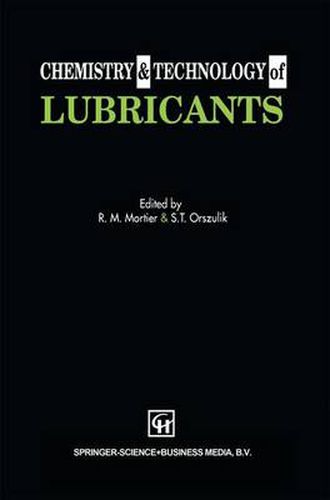Readings Newsletter
Become a Readings Member to make your shopping experience even easier.
Sign in or sign up for free!
You’re not far away from qualifying for FREE standard shipping within Australia
You’ve qualified for FREE standard shipping within Australia
The cart is loading…






This title is printed to order. This book may have been self-published. If so, we cannot guarantee the quality of the content. In the main most books will have gone through the editing process however some may not. We therefore suggest that you be aware of this before ordering this book. If in doubt check either the author or publisher’s details as we are unable to accept any returns unless they are faulty. Please contact us if you have any questions.
The use oflubricants began in ancient times and has developed into a major international business through the need to lubricate machines of increasing complexity. The impetus for lubricant development has arisen from need, so lubricatingpractice has precededan understandingofthescientificprinciples. This is not surprising as the scientific basis of the technology is, by nature, highly complex and interdisciplinary. However, we believe that the under standing of lubricant phenomena will continue to be developed at a mol ecular level to meet future challenges. These challenges will include the control of emissions from internal combustion engines, the reduction of friction and wear in machinery, and continuing improvements to lubricant performanceand life-time. More recently, there has been an increased understanding ofthe chemical aspects of lubrication, which has complemented the knowledge and under standing gained through studies dealing with physics and engineering. This book aims to bring together this chemical information and present it in a practical way. It is written by chemists who are authorities in the various specialisations within the lubricating industry, and is intended to be of interest to chemists who may already be working in the lubricating industry or in academia, and who are seeking a chemist’s view of lubrication. It will also be of benefit to engineers and technologists familiar with the industry who requirea more fundamental understanding oflubricants.
$9.00 standard shipping within Australia
FREE standard shipping within Australia for orders over $100.00
Express & International shipping calculated at checkout
This title is printed to order. This book may have been self-published. If so, we cannot guarantee the quality of the content. In the main most books will have gone through the editing process however some may not. We therefore suggest that you be aware of this before ordering this book. If in doubt check either the author or publisher’s details as we are unable to accept any returns unless they are faulty. Please contact us if you have any questions.
The use oflubricants began in ancient times and has developed into a major international business through the need to lubricate machines of increasing complexity. The impetus for lubricant development has arisen from need, so lubricatingpractice has precededan understandingofthescientificprinciples. This is not surprising as the scientific basis of the technology is, by nature, highly complex and interdisciplinary. However, we believe that the under standing of lubricant phenomena will continue to be developed at a mol ecular level to meet future challenges. These challenges will include the control of emissions from internal combustion engines, the reduction of friction and wear in machinery, and continuing improvements to lubricant performanceand life-time. More recently, there has been an increased understanding ofthe chemical aspects of lubrication, which has complemented the knowledge and under standing gained through studies dealing with physics and engineering. This book aims to bring together this chemical information and present it in a practical way. It is written by chemists who are authorities in the various specialisations within the lubricating industry, and is intended to be of interest to chemists who may already be working in the lubricating industry or in academia, and who are seeking a chemist’s view of lubrication. It will also be of benefit to engineers and technologists familiar with the industry who requirea more fundamental understanding oflubricants.